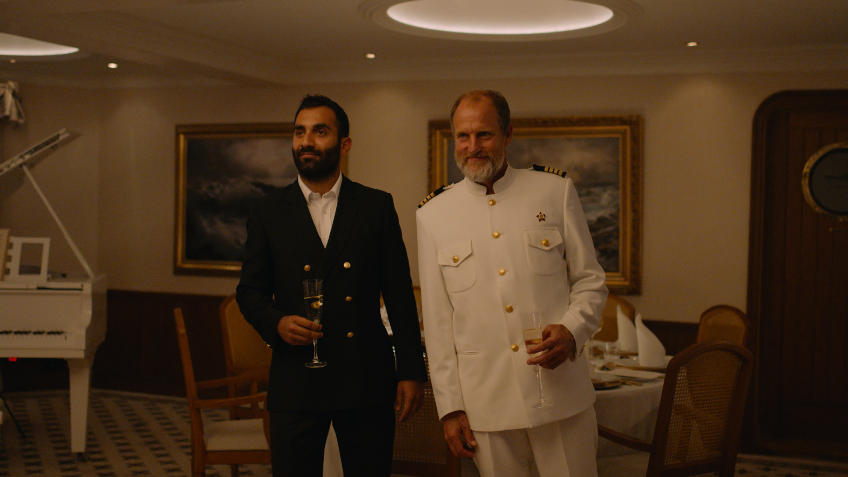Joyce Glasser reviews Triangle of Sadness (October 28, 2022) Cert 15, 149 mins.
The title of Swedish writer-director Ruben Östlund’s ambitious, beautifully shot but painfully self-indulgent third feature could refer to the film’s three parts, each set in a different location, which follow the relationship of beautiful couple Carl (Harris Dickinson) and Yaya (the late Charlbi Dean).
In the first part, the two models argue over a restaurant bill and then discuss gender roles and parity in a relationship in their hotel. In the second part they are guests on a luxury cruise in exchange for Yaya’s Instagram publicity. In the third, they struggle to survive the physical elements and class warfare when beached on a desert Island with a few survivors, including a cleaner and a pirate responsible for their ordeal.
True to its focus on the material world of modelling and the super-rich, however, the title actually refers to what beauticians call the worry wrinkle in between the eyebrows that a bit of Botox can eradicate. As it happens, the film’s characters will have a lot more to worry about than wrinkles as Östlund delights in taking them out of their comfort zones.
In 2014 Force Majeure marked Östlund as one of the most promising satirists of the Bourgeoisie since Louis Buñuel, and the English language remake, Downhill, and a West End stage version followed. With a bigger budget, running time and a cast that included the dashing Danish actor Claes Bang, Elisabeth Moss and Dominic West, his satire on the conceptual art world, The Square, won the Palme D’Or in 2017.
Triangle of Sadness is even more ambitious; part of it being shot on the Christina O, the yacht formerly owned by Aristotle Onassis and Jackie Kennedy. It is a rowdy, scatological, no holds barred dig at the super rich and their phony values written after a long period of research. With an international cast, it is Östlund’s first English language film and won last year’s Palme D’Or at the Cannes Film Festival.

On the one hand, you can see why. With all the yachts in the Mediterranean outside the luxury hotels where the jury of the great and good of the film world meet, how nice to feel cleansed by proxy, or pretend that Östlund is attacking someone else, by now, himself included. And there is, of course, bitter truth in this satire.
Part one is entitled Carl and Yaya and opens on a long silence after a meal. Both are stewing over the issue of the bill. What follows is a conversation that many couples can identify with.
Carl and Yaya’s relationship seems genuine, although it is built on each helping the other increase their social media standing. Yaya is more successful, so should she pay the bill, or should the man at least offer. ‘When you say, ‘thank you honey,’ it obliges me to pay.’ Carl reminds Yaya that she said she would pay. She retorts that he seemed happy to pay it and in fact, ended up picking up the tab. He reminds her it was on the table for a very long time…She says she hadn’t noticed. In the cab and then in the hotel room the conversation continues with each defensively pointing out how generous they are, but how the other one slips into gender roles. They both claim, ‘it’s not about the money,’ leaving the audience to ponder the question.
Part II is entitled The Yacht and surrounds the couple with many idiosyncratic, mostly rich, passengers. Already evenly bronzed and looking great in a bikini, Yaya lounges next to handsome Carl on the deck, guests of the management of this luxury yacht, cruising in the Mediterranean. Paula (Vicki Berlin, superb) is the service team leader instilling in the young, enthusiastic employees the yacht’s ethic: ‘it’s yes, ma’am, yes sir.’ No is not a word the guests want to hear. Taken literarly, this leads to a chain of pressured staffers giving in to the guilt of an alcoholic guest who insists that the staff are given time to cool off in the sea, or pool. The chef’s protests that the food will go bad are left unheeded.
The funniest scenes involve the sweet, little old English couple Clementine (Amanda Walker) and Winston (Oliver Ford Davies) whose wealth derives from “precision instruments… that have been upholding democracy all over the world.” They complain about EU Regulations, but proudly tell Yaya and Carl that ‘we pulled together and made it.’ They are arms dealers. At the end of Part II when it appears the yacht is under attack from pirates, Clementine bends over and picks up a hand grenade with pride. ‘Winston,’ she asks her husband, ‘Is this one of ours?’

As the Marxist, alcoholic ship’s captain who has to be coaxed out of his cabin for the captain’s dinner, Woody Harrelson tries his best to make us laugh, but the point is made instantly and what follows is overkill. His arguments about socialism and capitalism with Russian Oligarch Dimitry (Zlatko Burić) that are shouted over the intercom are too in your face. One wants to ask why the fabulously wealthy Oligarch does not have his own yacht, but this question is never addressed.
To say the Captain’s dinner goes badly is an understatement. To say more would either deprive you from the hilarious comedy of excess that follows or save you from an indulgent excess of repulsive tedium.
Part III, The Island, might remind you of I’m a Celebrity Get Me Out of Here, but only the ship’s Filipino cleaner, Abigail (Dolly de Leon) has the requisite survival skills. The point is, in a nutshell, that the pampered rich are helpless without the Proletariat. Taking command in the chaos, Abigail uses her know how to gain social status, material goods and even a handsome white lover.
The problem with Triangle of Sadness is that form and content merge in celluloid excess, with each part – and each scene within the parts – going on way past the point where we get the point. Östlund needed an Abigail to come in with a knife and cut away all the fat and blunted edges. There is some sharp satire here, but you have to plod through too much repetition to get to it.




